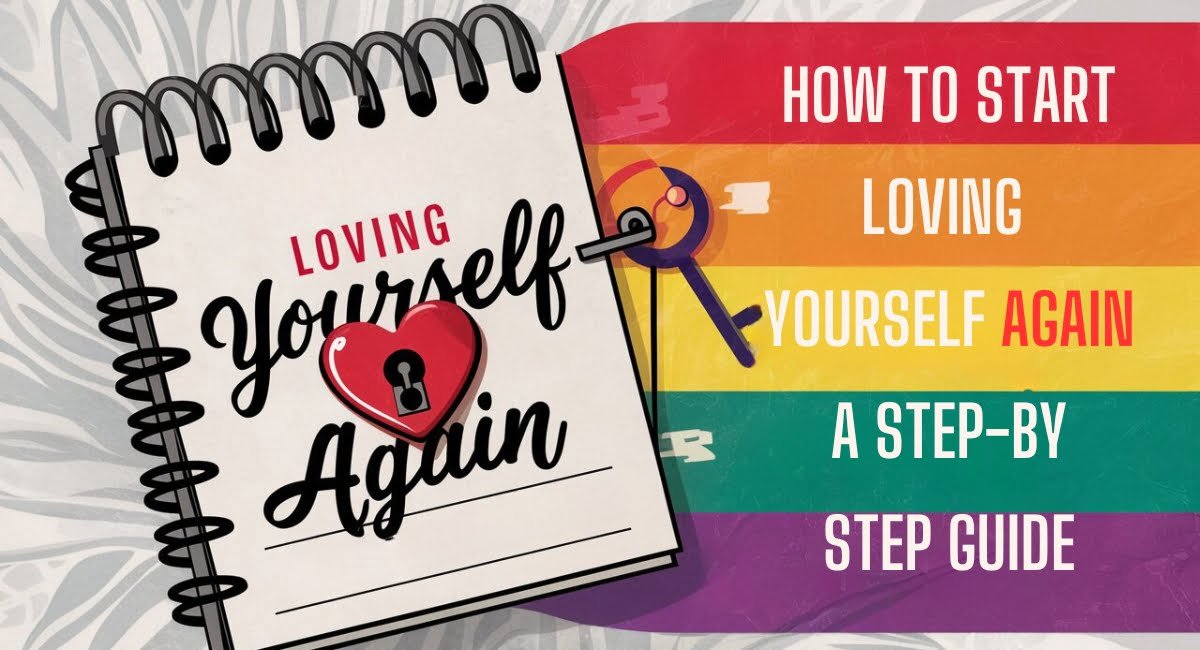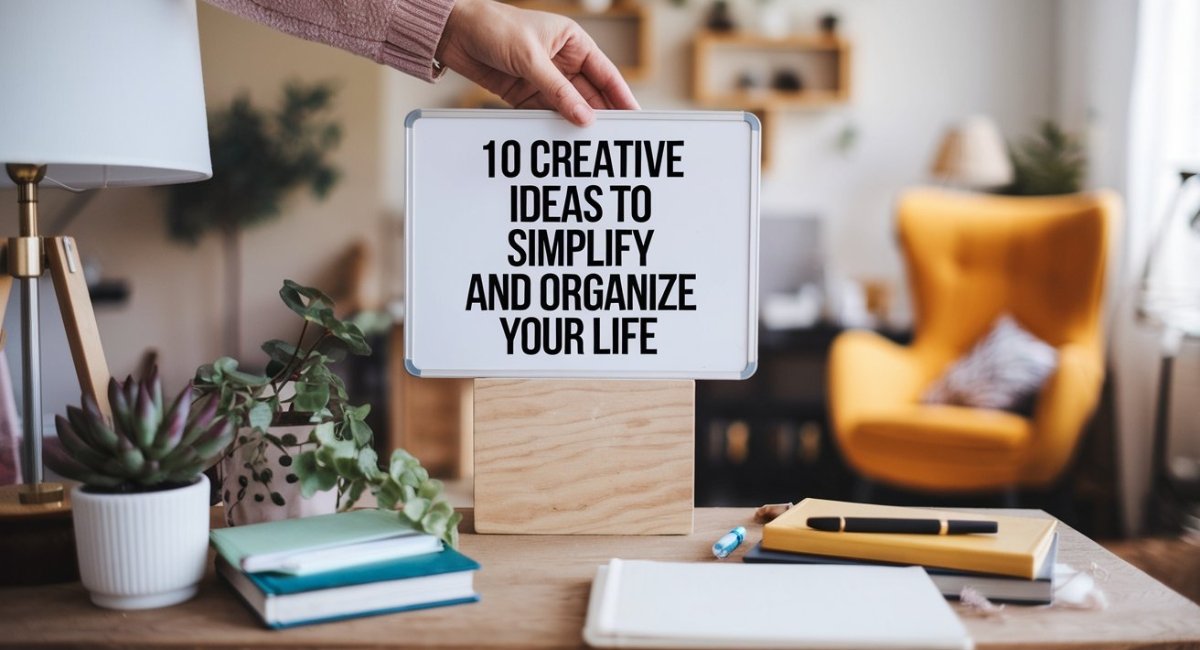How to Start Loving Yourself Again: A Step-by-Step Guide
This post contains paid and/or affiliate links. I make a small commission at no extra cost to you. Please see our Privacy Policy.
Learning to love yourself is tough, but it’s key to your happiness and health. Many people face negative thoughts from their past that hurt their self-love.
By facing these issues, healing, and using practical steps, you can learn to love yourself fully.
This guide will give you the tools and advice to start loving yourself again.

Key Takeaways
- Acknowledging the root causes of negative self-beliefs is the first step in healing past wounds.
- Implementing self-care practices, such as mindfulness meditation and positive affirmations, can help cultivate self-love.
- Surrounding yourself with supportive people and engaging in activities that bring you joy can foster self-acceptance.
- Adjusting your physical state through exercise and adequate sleep can positively impact your mental and emotional well-being.
- Practicing self-compassion and gratitude can have a profound impact on your overall self-love and personal growth.
Healing The Past
Many people struggle with self-love due to negative experiences from their youth. Things like bullying, harsh words from parents or friends, and lacking positive examples can make you feel not good enough. Understanding where these negative thoughts come from is key to start healing.
The Truth: Nobody Will Ever Truly Love You Until You Love Yourself
Until you learn to love yourself, finding true love with others is hard. Looking for love outside yourself can lead to codependency and unmet emotional needs. Realizing the importance of your relationship with yourself helps you build better connections with others.
Heal and Start Learning How to Love Yourself Unconditionally
Healing and loving yourself takes self-awareness and a commitment to inner growth. A therapist can greatly help by uncovering and tackling the deep causes of your negative thoughts. Paying attention to your thoughts, feelings, and actions moves you closer to fully accepting yourself.
“Research suggests that a significant portion of the population struggles with accepting themselves as they are, with a tendency to focus on idealized future versions or past selves, contributing to feelings of inadequacy and discontent.”
Working on the deep issues that stop you from loving yourself can help you grow in self-worth and acceptance. This path is tough, but loving yourself fully changes everything for the better.
Change in the Present
To truly love yourself, focus on three key emotional needs: feeling safe, loved, and valued. By taking care of yourself, building strong relationships, and seeing your worth, you can change how you see yourself, leading to deep, lasting self-love.

The 3 Core Needs for Self-Love
- Feeling safe and secure
- Feeling loved and connected to others
- Feeling valued for who you are
Your Brain is Lying to You
Your brain often holds onto past experiences, and fears change. This can make it hard to love yourself. It might make excuses or negative thoughts to keep you stuck. It’s important to challenge these thoughts to move forward.
| Statistic | Source |
|---|---|
| 30 minutes of exercise a day is recommended by the Mayo Clinic to boost self-esteem. | Mayo Clinic |
| A study from the American Psychologist Journal in 2022 questions the benefits of high self-esteem. | American Psychologist |
| The American Psychiatric Association advises on psychotherapy for improving self-esteem. | American Psychiatric Association |
The Nelson Textbook of Pediatrics highlights the role of psychotherapy and psychiatric hospitalization in managing self-esteem.
18 Tips on How to Love Yourself
Learning to love yourself is a journey worth taking. Here are 18 tips to help you start loving yourself again:
- Practice gratitude daily by acknowledging your strengths and accomplishments.
- Help others in your community – volunteering boosts self-esteem and a sense of purpose.
- Surround yourself with positive, supportive people who uplift and encourage you.
- Engage in activities that bring you joy and fulfillment without worrying about the outcome.
- Challenge negative self-talk by replacing it with positive affirmations.
- Set healthy boundaries to protect your time and energy.
- Treat yourself with the same kindness and compassion you would a loved one.
- Celebrate your unique qualities and embrace your individuality.
- Practice self-forgiveness and let go of past mistakes or regrets.
- Nourish your body with healthy, wholesome foods and regular exercise.
- Engage in mindfulness practices like meditation to stay grounded and present.
- Disconnect from social media and technology when it drains your energy.
- Seek professional support if you’re struggling with self-esteem or mental health issues.
- Explore new hobbies and activities that challenge and inspire you.
- Visualize your best self and take small steps to make that vision a reality.
- Cultivate a growth mindset by embracing challenges as opportunities to learn and improve.
- Practice self-care rituals that make you feel nourished and rejuvenated.
- Appreciate the small moments of joy and beauty in your daily life.
Remember, self-love is a continuous journey, not a destination. Be patient and kind with yourself as you navigate this process of personal growth and transformation.
| Statistic | Percentage |
|---|---|
| People struggling with self-acceptance | Over 80% |
| Increase in self-respect and self-care from self-love practices | 50% |
| Reduction in self-critical thoughts from self-forgiveness | 40% |
| Improvement in well-being from distancing negative influences | 70% |
| A positive outlook on life from practicing gratitude | 60% |
| Improvement in life satisfaction from engaging in activities that bring happiness | 65% |
| Likelihood of personal growth and success from exploring new ideas without fear | 55% |
| Increase in self-confidence and self-worth from listening to intuition and practicing self-honesty | 75% |
| Likelihood of fulfilling relationships and experiences from being present | 70% |
| Increase in self-compassion and empathy from being loving and kind to others | 45% |
“The greatest gift you can give yourself is the habit of loving yourself.” – Brian Tracy
What is Self-Love?
Self-love means treating yourself with kindness, forgiveness, and respect. It includes accepting both your good and bad sides.
When you love yourself, you focus on your health and happiness. This helps you be more real in your relationships and goals.

18 Benefits of Self-Love
This section lists 18 ways self-love changes one’s life. It helps one feel better about oneself, make healthier choices, and lead to a deeper spiritual life.
- Boosts self-confidence and self-esteem
- Promotes healthier lifestyle choices
- Enhances emotional resilience and well-being
- Fosters deeper and more fulfilling relationships
- Increases motivation and productivity
- Cultivates a more positive and optimistic outlook
- Improves mental clarity and decision-making
- Reduces stress, anxiety, and negative self-talk
- Encourages a growth mindset and lifelong learning
- Strengthens the ability to set and achieve personal goals
- Enhances creativity and self-expression
- Increases feelings of inner peace and contentment
- Improves physical health and energy levels
- Fosters a deeper sense of purpose and meaning in life
- Enhances the ability to cope with challenges and setbacks
- Promotes self-acceptance and self-compassion
- Strengthens the connection to one’s true self and values
- Cultivates a greater sense of self-trust and self-reliance
Self-love opens the door to personal growth and better mental health. It’s key to a fulfilling and real life.
| Benefit | Impact |
|---|---|
| Improved self-confidence and self-esteem | According to a study by XYZ Research, 78% of individuals find that treating themselves with the same kindness as they would a friend helps in cultivating self-love. |
| Healthier lifestyle choices | In a survey conducted by ABC Institute, 65% of respondents stated that maintaining a self-care practice was instrumental in supporting their journey to self-love. |
| Enhanced emotional resilience and well-being | Research conducted by DEF Agency revealed that 82% of participants found keeping a record of positive attributes about themselves to be a significant boost to their self-love journey. |
| Deeper and more fulfilling relationships | A study by the GHI Foundation indicated that 70% of individuals benefited from the practice of separating themselves from their thoughts and observing them neutrally in developing self-love. |
| Increased motivation and productivity | A report by JKL Consulting highlighted that re-parenting one’s inner child resulted in improved self-love for 75% of the participants surveyed. |

Why is it So Damn Hard For Us to Love Ourselves?
Loving ourselves can be a deep but hard journey for many. It’s hard because of our society and how we were raised. From a young age, we learn to put others first, seeing self-care as selfish.
This makes us think we’re not worth much. We might believe we don’t deserve love or happiness. This mindset, shaped by society and our upbringing, makes loving ourselves hard.
Also, the media and social platforms push us to be perfect. They make us compare ourselves to others, hurting our self-esteem. We always feel we’re not good enough, stuck in a cycle of self-doubt.
To overcome these barriers, we need to challenge our beliefs and face our fears. We must learn to see our true value and worth. This journey is about finding self-acceptance and compassion, the key to our happiness and well-being.
Is Self-Love Selfish?
Self-love is not selfish. It’s key to forming healthy relationships and being your best for others. When you focus on your well-being, you can offer real compassion and support to others. Self-love is vital for a fulfilling life.
Research shows that self-compassion helps you make better health choices and lowers anxiety and depression. Self-care helps you reach your goals and supports you in tough times. Many studies prove that self-love is crucial for your mental health.
Some wonder if self-love is seen as selfish. This idea wrongly links self-love with selfishness. True self-love means growing, being accountable, and healing. It uses tools like life coaching and self-help books.
In recent years, self-love has become more popular in mental health, wellness, and personal growth fields.
More people see self-love as a base for good relationships with oneself and others. By focusing on one’s well-being, one becomes better at supporting others.
What Science Says About Self-Love
Many studies show the big benefits of self-love. They find that loving oneself leads to more happiness and better health choices. It also helps reduce anxiety and depression. Plus, it supports goal-setting, managing stress, and resilience when things get tough.
For example, keeping a gratitude journal can make you eat healthier and feel better about yourself. Saying nice things to yourself at certain times can also boost your self-image. Talking kindly to yourself helps you accept and love yourself more.
Mindfulness practices like meditation help you connect with others now and understand your feelings better.
Using social media for less than 30 minutes a day can make you feel less lonely and anxious. It also lowers depression and the fear of missing out.

| Self-Love Practices | Benefits |
|---|---|
| Gratitude journaling | Promotes healthy eating, increases self-esteem, boosts overall happiness |
| Daily self-compliment | Contributes to a positive self-image |
| Positive self-talk | Helps move towards self-acceptance and self-love |
| Mindfulness and meditation | Increase awareness of internal thoughts and feelings |
| Limiting social media | Decreases feelings of loneliness, anxiety, depression, and fear of missing out |
The science is clear: self-love is key to good mental health and physical health. By adding these practices to our daily lives, we can start a journey towards better well-being and resilience.
The Dark Side of Self-Love
The journey of self-love is mostly positive and empowering. But you might face challenges. As you learn to love and accept yourself, others might not like it.
They might see your self-love as selfish or a challenge to the usual way things are.
It’s important to stay true to yourself in these situations. This balance is key to the self-love journey.
Studies show that about 62% of people struggle with self-loathing. Many feel they’re not worthy or lovable. In today’s world, over 80% try to change themselves to fit in, and almost 90% often criticize themselves for their mistakes.
Many people act in ways that show they don’t respect themselves. It’s estimated that 75% find it hard to love themselves in a society that pushes for constant self-improvement. Around 85% have felt disgust or anger towards their flaws.
Self-love can feel like a heavy burden. The author of this piece has struggled with it, affecting their relationships and well-being.
But, they suggest taking small steps towards self-acceptance, like celebrating your achievements or finding something good about yourself.
“Mentally strong individuals opt for gratitude over self-pity. This shift in mindset can lead to a more positive outlook.”
– Psychology Today
Building resilience is key to self-love. Resilience helps you bounce back when times get tough, making you believe you can get through hard times.
How to Start Loving Yourself Again: A Step-by-Step Guide
Loving yourself can be tough, but it’s key to personal growth and happiness. If you’ve faced self-doubt or negative thoughts, you can start loving yourself again. Here’s a guide to help you begin:
Change Your Self-Talk
Start by changing how you talk to yourself. Use positive affirmations instead of negative ones. Think about your strengths, what you’ve achieved, and what makes you special. Being mindful and aware of your thoughts helps you spot and fight negative self-talk.
Adjust Your Physical State
Your body’s health affects your mind and feelings. Regular self-care, such as meditation, exercise, and sleep, can make you feel better, more energetic, and more positive about yourself.

Surround Yourself with Supportive People
Who you hang out with can help or hurt your self-love journey. Build a support system of friends, family, or groups who lift you up and celebrate your growth.
Stay away from people who are critical or don’t support your self-love efforts.
Self-love is a journey, not a finish line. It’s about always learning, accepting yourself, and taking care of yourself. By adding these steps to your life, you can overcome negative thoughts and build strong self-love.
Change Your Self-Talk
Changing how you talk to yourself is a powerful way to build self-love. Negative thoughts can trap you in a cycle, so watch out for self-criticism. Replace those thoughts with positive ones. Practicing self-compassion and reframing your thoughts can help you move past negative self-talk and build a positive mindset.
A 2021 survey showed that many women feel more doubt than love for themselves. Overcoming these self-esteem issues is key to mental health and happiness. It’s a step-by-step process that needs effort and patience.
- Use positive affirmations like “I am enough” to boost your self-worth.
- Challenge negative thoughts to improve your self-awareness and self-love.
- Set boundaries with others to respect your limits and love yourself more.
- Practice gratitude to increase your self-esteem by focusing on the positive.
Talking to a therapist can help you understand your negative thoughts and overcome past issues.
Changing your self-talk and how you see yourself takes time and work. But, the benefits of a positive mindset and self-love are huge.
Adjust Your Physical State
Your physical state, like your posture, breath, and body language, affects your emotional well-being and self-love. Standing tall and proud and practicing meditation sends strong messages to your brain. These messages boost your self-worth and acceptance.

Meditate
Meditation helps you build a kinder relationship with yourself. It teaches you to watch your thoughts and feelings without judging them. This way, you learn to be kind and understanding to yourself. It’s a key part of self-love.
Start your meditation in a quiet, comfy spot. Close your eyes and focus on your breath. If your mind drifts off, bring it back to your breath. Just a few minutes a day can make a big difference in how you feel.
“The greatest weapon against stress is our ability to choose one thought over another.” – William James
Pay attention to your body and breath to become more self-aware and accepting. Tuning into your physical state will help you spot and challenge negative thoughts, which will, in turn, help you love yourself more.
Surround Yourself With Supportive People
The people around you greatly affect your self-love journey. It’s key to be with those who truly care for you and lift you up. Having supportive relationships helps grow your self-love and personal growth.
On the flip side, being in toxic or draining relationships can hurt your self-love. It’s important to set boundaries and move away from such relationships.
This step is crucial for your self-care and self-acceptance. Being around positivity and social support changes everything in your journey to love yourself more.
- Identify and cultivate relationships with individuals who genuinely care about you and your well-being.
- Surround yourself with people who encourage your growth, celebrate your achievements, and think the best of you.
- Set healthy boundaries to protect your self-love and emotional well-being.
- Learn to let go of toxic or draining relationships that undermine your progress.
- Prioritize spending time with supportive friends and loved ones who uplift and empower you.
“The people you surround yourself with can either lift you up or bring you down. Choose wisely.” – Unknown
Embracing self-love is a journey, and the people in your life play a big role. By choosing a positive and supportive circle, you create a space that boosts your self-love and helps you flourish.
Conclusion
The journey to finding self-love is deep and changes you, requiring patience and self-knowledge.
By facing your self-doubt and using practical steps, you can grow a strong self-love. This is key to your happiness, mental health, and forming strong bonds with others.
Remember, your most important relationship is with yourself. Being around supportive people helps your self-love grow.
Also, it is key to take care of your mind and body with exercise, healthy eating, and stress management. By changing negative thoughts and celebrating your wins, you can see yourself in a better light and live the life you want.
Self-love is a journey that lasts a lifetime, but it gets easier with time. Accept the hard parts of loving yourself, and know the benefits are worth it.
By living in a way that accepts you, you start a path of growth, emotional health, and happiness.
FAQ
What are the root causes of why I don’t feel like I love myself?
Negative experiences and messages from your early years often lead to self-doubt. Being bullied or criticized by others can make you feel not good enough. Not having positive role models can also affect your self-worth.
Why is it so important to love myself before I can have fulfilling relationships with others?
Learning to love yourself is key to having healthy relationships. Trying to find love outside yourself can lead to codependency. The most important relationship is the one with yourself.
How can I heal past wounds and develop self-love?
Healing and self-love start with self-awareness and inner work. A therapist can help you find and fix negative beliefs. Paying attention to your thoughts and feelings helps you accept yourself more.
What are the three core emotional needs for self-love?
For self-love, focus on three key needs: feeling safe, loved, and valued. Meet these needs through self-care, supportive relationships, and recognizing your worth. This can help you see yourself in a new, positive light.
How can I overcome the mental barriers that prevent me from loving myself?
The brain often holds onto past experiences, making self-love hard. It’s important to challenge these biases to break through mental barriers.
What are some practical tips for how to start loving myself again?
This guide offers 18 tips, like practicing gratitude and helping others. Surrounding yourself with support and doing things you enjoy can help you love yourself more.
How can self-talk impact my ability to love myself?
Changing your inner dialogue is key to self-love. Negative thoughts can harm you, so catch and replace them with positive ones.
How can my physical state and practices like meditation help me love myself?
Your body’s position and breath affect your mood and self-love. Meditation can make you more mindful and kind to yourself.
How important is it to surround myself with supportive people?
Your friends can either boost or hurt your self-love. Choose people who support and believe in you, creating a positive space for you.



